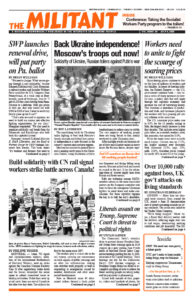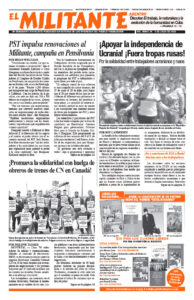July 7, 1997
LONDON — Sinn Fein leader Gerry Adams and chief negotiator Martin McGuinness were elected May 1 to the U.K. Parliament. In response to the gains made by the Republicans in the recent elections, London briefly reopened bilateral talks with Sinn Fein.
However, both Adams and McGuinness were denied access to their full rights as Members of Parliament. The Speaker of Parliament ruled they must swear an oath of allegiance to the Queen of England; both refused to do so.
Since the May 1 election of the Labour government, Ireland has been a central question in politics here. Labour prime minister Anthony Blair said, “My agenda is not a united Ireland. … Let me make one thing absolutely clear. Northern Ireland is part of the United Kingdom.”
“Nationalists felt disturbed to hear Mr. Blair declare himself a unionist with such gusto,” Adams stated.
July 7, 1972
The June 23-24 founding conference of Labor for Peace drew more than 1,200 delegates and observers. The conference, the largest labor gathering ever held against the war, passed a resolution for the immediate withdrawal of all U.S. forces from Indochina. The statement condemned the destruction in Indochina and linked the war to inflation, unemployment, and wage controls.
The immediate withdrawal can be achieved only by mobilizing masses of workers, along with other sections of the population, in actions organized independently of the Democratic and Republican parties.
What course of action Labor for Peace will pursue remains to be seen. But the fact that such a large and broad labor antiwar conference has been held can encourage more unions to take antiwar positions and give impetus to the work of antiwar committees within the unions.
July 5, 1947
The union rank and file are clamoring for militant action on every front to openly defy the Taft-Hartley Slave Labor Law. This was made clear during the first week after the new law’s passage by the mine and shipyard strikes and by the widespread demand from the ranks for a nationwide protest strike against the law.
The CIO and AFL leaders rejected out of hand any suggestion of militant union action. The top union leaders likewise indicated they intended to continue their bankrupt and dangerous policy of supporting capitalist politicians for office.
The workers have long since shown their desire for a party of their own. But they must break through the obstruction and hostility of the union leaders. The Slave Labor Law and its promulgators will be smashed decisively only on the political arena. The weapon needed is labor’s own party.

